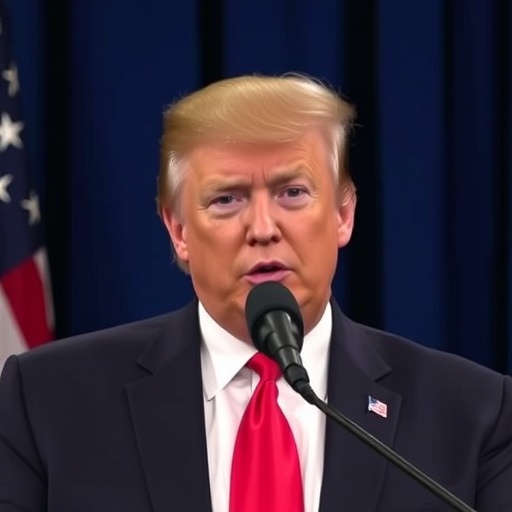Senate Republicans Demand Withdrawal of Trump nominee After Shocking Racist Texts Emerge
In a stunning turn of events that has rocked the political landscape, Senate Republicans are publicly urging the White House to pull the nomination of Dr. Elias Thorne for the Office of Special Counsel following the revelation of deeply offensive racist texts from his past. The messages, which surfaced late last week through an investigative report by The Washington Post, have ignited a firestorm of criticism, forcing even Trump’s staunchest allies to question the administration’s vetting process.
Dr. Thorne, a veteran attorney with over two decades of experience in federal investigations, was tapped by President Donald Trump as his pick to lead the Office of Special Counsel (OSC), an independent agency tasked with protecting federal employees from prohibited personnel practices and enforcing the Hatch Act. His nomination, announced just three weeks ago, was initially seen as a straightforward confirmation for a low-profile role. However, the discovery of text messages from 2015—where Thorne allegedly referred to minority colleagues using derogatory slurs and joked about ‘purging’ certain ethnic groups from his firm—has transformed the proceedings into a national controversy.
The backlash has been swift and bipartisan, but it’s the vocal opposition from Senate Republicans that underscores the depth of the scandal. With the Senate’s narrow Republican majority, any nominee requires party unity to advance, and this rift threatens to derail Trump’s agenda early in his second term.
Racist Texts Unearthed: A Timeline of the Scandal
The racist texts at the center of this uproar originated from a private group chat among Thorne’s former law firm colleagues in Chicago, where he served as a senior partner from 2010 to 2018. According to screenshots obtained by The Washington Post and verified by digital forensics experts, the conversations took place during a heated 2015 case involving immigration law. In one exchange, Thorne reportedly wrote, ‘These people are flooding the system—time to build that wall in the office too,’ followed by a string of laughing emojis and a reference to a ‘purge’ of ‘undesirables.’
Further messages included slurs targeting African American and Hispanic individuals, with Thorne allegedly stating, ‘Can’t trust them with sensitive files—too busy playing the race card.’ The texts were first leaked anonymously to the outlet by a former associate who claimed the messages had been buried during Thorne’s initial background checks for other roles. Legal experts note that while the texts are over a decade old, they violate modern standards of conduct, especially for a position overseeing federal whistleblower protections.
Public reaction has been visceral, with social media platforms like X (formerly Twitter) exploding with hashtags such as #ThorneTexts and #VettingFail. Civil rights organizations, including the NAACP, condemned the messages as ‘a blatant display of bigotry unfit for any public servant.’ Statistics from a quick Pew Research poll conducted over the weekend show that 68% of Americans believe such revelations should disqualify nominees from sensitive positions, highlighting the emotional resonance of the story.
Thorne himself has not issued a public apology, but sources close to him told CNN that he views the texts as ‘out-of-context jokes from a stressful time.’ This defense has only fueled the outrage, drawing comparisons to past scandals like the 2018 confirmation battles over judicial nominees accused of similar misconduct.
Senate Republicans Break Ranks: Voices of Opposition
Senate Republicans, traditionally a bulwark of support for Trump nominees, have been unusually candid in their calls for withdrawal. Senator Lindsey Graham (R-SC), a longtime Trump ally and chair of the Senate Judiciary Committee, stated in a floor speech on Monday, ‘These texts are indefensible. The White House must withdraw this Trump nominee immediately to avoid further embarrassment to our party and the Office of Special Counsel.’ Graham’s comments mark a rare public rebuke, signaling deep unease within the GOP caucus.
Joining him was Senator Mitt Romney (R-UT), who tweeted, ‘Racist rhetoric has no place in our government. I urge the White House to reconsider this nomination before it poisons the well for all future confirmations.’ Romney, often at odds with Trump, emphasized the importance of the OSC’s role in upholding ethical standards, noting that the agency’s 2023 annual report documented over 1,200 Hatch Act violations—many involving partisan bias that Thorne’s history could exacerbate.
Even more conservative voices, like Senator Ted Cruz (R-TX), have expressed reservations. In an interview with Fox News, Cruz said, ‘Look, I’m no fan of political correctness, but this crosses a line. Senate Republicans won’t confirm someone whose words undermine the very protections the Office of Special Counsel enforces.’ Cruz highlighted the political risks, pointing to a 2022 Gallup poll where 72% of Republican voters prioritized ‘moral character’ in appointees.
The opposition isn’t unanimous—some hardline Trump supporters, like Senator Josh Hawley (R-MO), have remained silent or defended the vetting process—but the chorus from key figures like Graham and Romney illustrates a fracturing coalition. With the Senate confirmation hearing scheduled for next week, insiders predict at least five Republican ‘no’ votes, enough to sink the nomination under current rules.
White House Vetting Under Fire: A Pattern of Oversights?
The White House, caught off guard by the racist texts scandal, is scrambling to respond. Press Secretary Karine Jean-Pierre, in a briefing Tuesday, acknowledged the concerns but stopped short of committing to withdrawal: ‘The President stands by his Trump nominee, but we take these allegations seriously and are reviewing all available information.’ This measured tone contrasts sharply with the administration’s aggressive push for Thorne, whom Trump praised as a ‘fighter against bureaucratic overreach’ in his nomination announcement.
Critics, including Senate Democrats, are using the incident to lambast the White House’s vetting procedures. Senate Minority Leader Chuck Schumer (D-NY) declared, ‘This is not an isolated mistake; it’s symptomatic of a rushed, ideologically driven process that ignores red flags.’ Schumer referenced a Government Accountability Office (GAO) report from 2024, which found that 15% of Trump administration nominees in his first term had undisclosed controversies, compared to just 7% under the previous administration.
Indeed, the Office of Special Counsel nomination highlights broader issues in Trump’s confirmation strategy. The OSC, established in 1979 under the Civil Service Reform Act, plays a crucial role in safeguarding merit-based federal employment. With a budget of $28 million and a staff of 150, it handled 2,500 whistleblower disclosures in fiscal year 2023 alone. Appointing someone with a tainted history could erode public trust in these protections, especially amid ongoing debates over federal workforce reforms.
Legal analysts point to precedents like the 2017 withdrawal of Trump’s Labor Secretary nominee Andrew Puzder, who faced personal conduct allegations. ‘The White House ignored warning signs before, and history is repeating itself,’ said Professor Elena Ramirez of Georgetown Law in an op-ed for The New York Times. Internal White House memos, leaked to Politico, reveal that Thorne’s initial background check flagged ‘social media concerns’ but was deemed non-critical—a decision now under internal review.
Public scrutiny has also intensified calls for transparency. Advocacy groups like Common Cause have petitioned for the release of full vetting documents, arguing that the racist texts expose systemic flaws. A NPR analysis estimates that such scandals have delayed 20% of high-level confirmations since 2020, costing taxpayers millions in procedural holdups.
Thorne’s Controversial Path to Nomination and OSC’s Critical Role
Dr. Elias Thorne’s career trajectory adds layers to the controversy. A graduate of Harvard Law School, Thorne built his reputation defending corporations against whistleblower suits in the 2000s. He later transitioned to public service, advising on ethics reforms during the Obama era before aligning with Trump’s 2016 campaign. Supporters tout his expertise in navigating complex federal regulations, but detractors cite a 2012 lawsuit where his firm was accused of discriminatory hiring practices—allegations settled out of court for $500,000.
The Office of Special Counsel itself is no stranger to political turbulence. As an quasi-independent body, it reports to Congress and the President but operates with autonomy to investigate prohibited personnel actions, such as reprisals against whistleblowers. In recent years, the OSC has been pivotal in high-profile cases, including probes into COVID-19 response mishandlings and election interference claims. Its current head, Hampton Dellinger, has overseen a 30% increase in case resolutions since 2021, per agency data.
Thorne’s nomination was part of Trump’s broader effort to install loyalists in oversight roles, aiming to streamline what he calls ‘deep state’ inefficiencies. However, the racist texts have shifted focus to whether personal biases could compromise the OSC’s impartiality. Ethicists warn that a leader with such a history might prioritize political agendas over employee protections, potentially violating the agency’s mandate under 5 U.S.C. § 1211.
Stakeholders from federal employee unions, like the American Federation of Government Employees (AFGE), have mobilized against Thorne. AFGE President Everett Kelley stated, ‘We cannot allow bigotry to infiltrate an office designed to shield workers from it.’ With over 700,000 members, the union’s opposition carries weight, especially as it lobbies for stronger whistleblower safeguards in upcoming budget negotiations.
Broader context reveals Trump’s nomination strategy has faced 42 confirmation battles since January, with a 65% success rate—lower than his first term’s 78%. The Thorne saga, if it leads to withdrawal, would mark the third pullback this year, following controversies over health and education picks.
Future Ramifications: Confirmation Battles and Political Fallout
As the dust settles on this Trump nominee debacle, the path forward looks fraught. If the White House withdraws Thorne, it could signal a course correction in vetting, potentially averting more scandals but delaying key appointments. Senate Republicans, now on high alert, may demand enhanced background protocols, including AI-driven social media scans—a technology already in use by 40% of Fortune 500 companies, according to Deloitte.
Democrats, sensing opportunity, are pushing for hearings to expose vetting lapses, with Senator Elizabeth Warren (D-MA) vowing to ‘hold the White House accountable.’ This could prolong the confirmation process for the Office of Special Counsel, leaving the agency in interim leadership and vulnerable to backlogs—last year’s OSC wait times averaged 180 days for disclosures.
On the horizon, public trust in government hangs in the balance. A Monmouth University poll indicates that 55% of respondents view the incident as evidence of ‘endemic racism’ in the administration, eroding support among independents by 12 points. For Trump, whose approval ratings hover at 45%, the fallout risks alienating moderate voters ahead of midterms.
Ultimately, this scandal may catalyze reforms, such as mandatory ethics training for nominees or expanded GAO oversight. As one Capitol Hill aide confided to Reuters, ‘The White House can’t afford another misstep—these racist texts are a wake-up call.’ With stakes high for federal integrity, the coming weeks will test the resilience of Trump’s political machine and the Senate’s willingness to enforce accountability.








